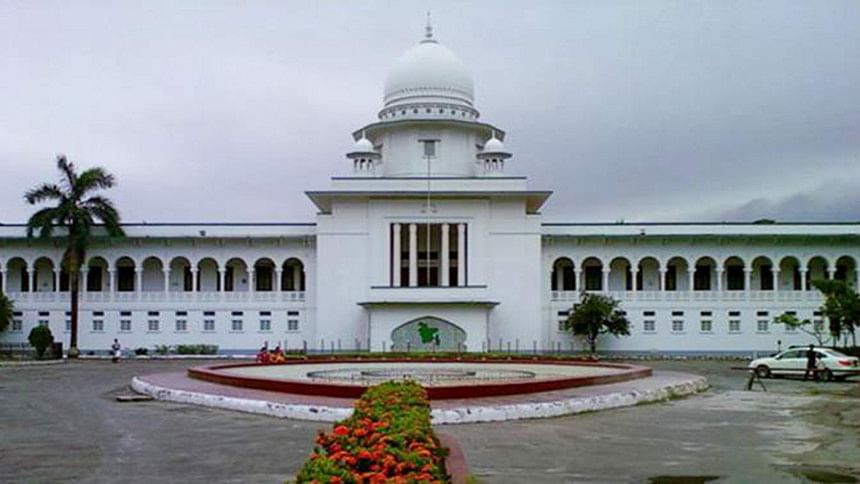Legality of Article 70: HC delivers split order

The High Court yesterday gave a split order on the legality of article 70 of the constitution, which deals with the cancellation of membership of MPs for voting against their political party.
Justice Moyeenul Islam Chowdhury, senior judge of the two-member HC bench, issued a rule on the government, asking why the article should not be declared unconstitutional.
Justice Md Ashraful Kamal, the other judge, summarily rejected the petition.
Under article 70, lawmakers lose their seats in parliament if they vote in the House against the party that nominated them.
The judges will now send the writ petition along with their split order to Justice Abdul Wahhab Miah, who is performing the functions of the chief justice, for a decision.
Justice Wahhab will then assign another HC bench for its hearing and disposal, Deputy Attorney General Motaher Hossain Sazu told The Daily Star.
In his order, Justice Moyeenul said members of parliament could not discharge their duties properly as they could not express their opinions independently because of article 70.
The MPs are not independent as they could not vote against their party decisions and that is why they are subservient to their parties, he noted.
Political parties, not the people, are the source of all powers under article 70, although the people are the source of all powers under article 7 of the constitution, Justice Moyeenul said.
The Appellate Division of the Supreme Court has accepted the HC observation regarding article 70 in the judgment of the 16th amendment case, he said in his order.
The SC has upheld the HC verdict that scrapped the 16th amendment which had empowered parliament to remove the SC judges for incapacity or misconduct.
In its verdict in the case, the top court had said, “By reason of article 70 of our constitution and its impact on members of Parliament leads to the irresistible conclusion that this new mechanism cannot be expected to function independently and neutrally if a judge attracts displeasure from the political party in power, he may be subjected to removal by parliament”.
In his order yesterday, Justice Moyeenul said it was mandatory for the HC Division to abide by the Appellate Division verdict.
There are elements for issuing a rule in response to this writ petition that challenged article 70, he said.
The HC judgment on the 16th amendment case, Justice Moyeenul and his colleague Justice Quazi Reza-Ul Hoque had observed, "Keeping article 70 of Bangladesh constitution as it is, the members of parliament must toe the party line in case of removal of any judge of the Supreme Court. Consequently, the Judge will be left at the mercy of the party high command.
“As regards article 70 of the constitution of Bangladesh, we must say that this article has fettered the members of parliament. It has imposed a tight rein on them. Members of parliament cannot go against their party line or position on any issue in the parliament. They have no freedom to question their party's stance in parliament, even if it is incorrect. They cannot vote against their party's decision. They are, indeed, hostages in the hands of their party high command, said the two judges.”
Rejecting the petition, Justice Ashraful Kamal yesterday said that though the Appellate Division accepted the High Court Division observation regarding article 70, 16th amendment case was related to the judiciary and the Supreme Judicial Council over the removal of SC judges.
Article 70 was incorporated in the constitution in 1972 and since then no question has arisen in parliament or the government over the justification of this article, and people did not raise any question on this issue, he said.
There is no precedence of any misuse of the article in the country, he added.
Justice Ashraful said that HC could not formulate the constitution or the law.
This court can only rule whether the law made by parliament is contrary to the constitution or not and, for this reason, the SC has scrapped the fifth and 13th amendments to the constitution, he said.
Also, the writ petitioner did not specifically say in the petition which articles of the constitution are contrary to article 70, he added.
However, in his writ petition submitted in April last year, SC lawyer Eunus Ali challenged the legality of article 70 of the constitution, saying that the article is against democracy and articles 7, 19, 26, 27, 44, 31 and 119 of the constitution.
Justice Ashraful also said members of parliament are elected representative of people and, therefore, the court cannot force them to formulate any law and cannot raise any question on what purpose they formulated the law.
Justice Ashraful had disagreed also with Justice Moyeenul and Justice Quazi Reza-Ul in the 16th amendment verdict.
In the 16th amendment verdict, he said the said amendment mad the constitution free from a “black spot and reestablished the real independence of the judiciary”.

 For all latest news, follow The Daily Star's Google News channel.
For all latest news, follow The Daily Star's Google News channel. 



Comments